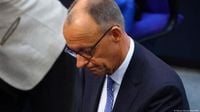In a stunning turn of events in Berlin, Friedrich Merz, the candidate for Chancellor of Germany, failed to secure the required majority in the Bundestag election held on May 6, 2025. This marks the first time in post-war German history that a chancellor candidate has not achieved a majority in the initial voting round, a situation that has sent shockwaves through the political landscape.
During the secret ballot, Merz garnered support from only 310 members of parliament (MPs), falling short of the 316 votes needed for an absolute majority. The coalition of the Christian Democratic Union (CDU), Christian Social Union (CSU), and Social Democrats (SPD) holds a total of 328 seats in the Bundestag, meaning that a significant number of coalition members voted against their own candidate.
According to the German constitution, the Bundestag has 14 days to elect a new chancellor. If no absolute majority is reached in the next round of voting, which could occur later on May 6 or potentially on May 9, 2025, the candidate can be elected with a simple majority. If this second attempt also fails, the election process will move into a third phase, necessitating immediate new elections.
This unprecedented failure has been described by political analysts as a "significant weakening of Merz," with many questioning the stability of the newly formed coalition. Richard Walker, a correspondent for Deutsche Welle, emphasized, "This new situation will not be a problem if a second vote takes place soon. However, if this process drags on, questions will arise."
The mood in the Bundestag was tense following the vote, as members of the coalition gathered to discuss their next steps. Jens Spahn, a member of the CDU/CSU parliamentary group, confirmed that Merz would not withdraw his candidacy and would seek another vote at the request of the coalition. The urgency of the situation is palpable, as the coalition must ensure full attendance and discipline in any future voting to avoid another failure.
Political experts have remarked on the implications of this vote, noting that the expectations for Merz and his government were exceedingly high, both domestically and among Germany's allies. Bartłomiej Kot, an expert from the Pulaski Foundation, stated, "The ability of Germany to implement reforms, invigorate the economy, and strengthen defense capabilities is crucial for European policy. This is not just about deterrence against Russia but also ensuring innovation and competitiveness in the European economy."
The recent parliamentary elections in February 2025 saw the Christian Democratic parties securing 28.6 percent of the vote, while the Social Democrats suffered a significant defeat, only achieving 16.4 percent—the worst result in the party's post-war history. The CDU/CSU coalition with the SPD was the only viable option for forming a majority government among the democratic center parties. Notably, both the CDU and CSU have ruled out any collaboration with the far-right Alternative for Germany (AfD), which received 20.8 percent of the vote and was recently classified as an extremist party by the German domestic intelligence agency.
This political impasse has raised concerns not only within Germany but also among its neighbors. Poland, for instance, may interpret this situation as a signal to lower its expectations regarding Germany's commitment to security and its stance towards Russia. Despite this, Warsaw remains optimistic about Merz's positive rhetoric and wishes him success, while also adopting a more pragmatic approach to the limitations of Germany's capabilities.
As the coalition parties navigate this unprecedented political landscape, the implications of Merz's failure to secure a majority extend beyond immediate governance. The instability could fuel further support for the AfD, as they capitalize on public dissatisfaction with the traditional parties' inability to present a united front on strategic goals.
With the clock ticking down to the next vote, all eyes are on the Bundestag as the coalition grapples with the challenge of uniting its members and restoring confidence in its leadership. The stakes are high, as the outcome of this political drama will shape Germany's direction in the months to come.
As Friedrich Merz prepares for what could be a pivotal moment in his political career, the future of Germany's leadership hangs in the balance, with potential ramifications for European stability and security. The coming days will be crucial, not only for Merz and the coalition but for the entire German political landscape.



